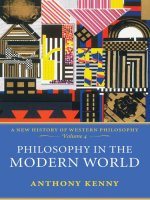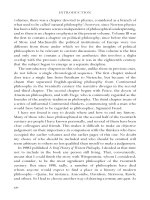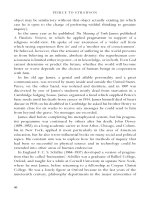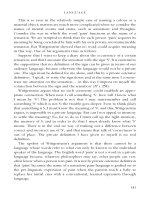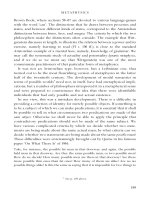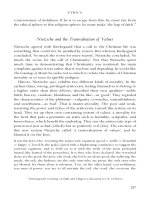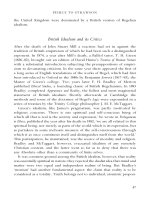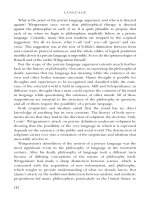The oxford history of historical writing volume 4 1800–1945
Bạn đang xem bản rút gọn của tài liệu. Xem và tải ngay bản đầy đủ của tài liệu tại đây (5.64 MB, 673 trang )
Tai Lieu Chat Luong
T H E OX FOR D H IS TORY OF
H IS TOR IC A L W R I T I NG
TH E OX F O R D HI S TO RY O F H I S TO R I C A L W R I T I N G
The Oxford History of Historical Writing is a five-volume, multi-authored scholarly
survey of the history of historical writing across the globe. It is a chronological
history of humanity’s attempts to conserve, recover, and narrate its past with
considerable attention paid to different global traditions and their points of
comparison with Western historiography. Each volume covers a particular period,
with care taken to avoid unduly privileging Western notions of periodization,
and the volumes cover progressively shorter chronological spans, reflecting both
the greater geographical range of later volumes and the steep increase in historical
activity around the world since the nineteenth century. The Oxford History of
Historical Writing is the first collective scholarly survey of the history of historical
writing to cover the globe across such a substantial breadth of time.
Volume 1: Beginnings to ad 600
Volume 2: 400–1400
Volume 3: 1400–1800
Volume 4: 1800–1945
Volume 5: Historical Writing since 1945
THE OXFORD HISTORY OF HISTORICAL WRITING
Daniel Woolf
general editor
The Oxford History of
Historical Writing
volume 4: 1800–1945
Stuart Macintyre, Juan Maiguashca, and Attila Pók
volume editors
Ian Hesketh
assistant editor
1
1
Great Clarendon Street, Oxford ox2 6dp
Oxford University Press is a department of the University of Oxford.
It furthers the University’s objective of excellence in research, scholarship,
and education by publishing worldwide in
Oxford New York
Auckland Cape Town Dar es Salaam Hong Kong Karachi
Kuala Lumpur Madrid Melbourne Mexico City Nairobi
New Delhi Shanghai Taipei Toronto
With offices in
Argentina Austria Brazil Chile Czech Republic France Greece
Guatemala Hungary Italy Japan Poland Portugal Singapore
South Korea Switzerland Thailand Turkey Ukraine Vietnam
Oxford is a registered trade mark of Oxford University Press
in the UK and in certain other countries
Published in the United States
by Oxford University Press Inc., New York
© Oxford University Press 2011
© Editorial Matter Stuart Macintyre, Juan Maiguashca, and Attila Pók 2011
The moral rights of the authors have been asserted
Database right Oxford University Press (maker)
First published 2011
All rights reserved. No part of this publication may be reproduced,
stored in a retrieval system, or transmitted, in any form or by any means,
without the prior permission in writing of Oxford University Press,
or as expressly permitted by law, or under terms agreed with the appropriate
reprographics rights organization. Enquiries concerning reproduction
outside the scope of the above should be sent to the Rights Department,
Oxford University Press, at the address above
You must not circulate this book in any other binding or cover
and you must impose the same condition on any acquirer
British Library Cataloguing in Publication Data
Data available
Library of Congress Cataloging in Publication Data
Data available
Typeset by SPI Publisher Services, Pondicherry, India
Printed in Great Britain
on acid-free paper by
MPG Books Group, Bodmin and King’s Lynn
ISBN 978–0–19–953309–1
1 3 5 7 9 10 8 6 4 2
The Oxford History of Historical Writing was made possible by the
generous financial support provided by the Offices of the Vice-President
(Research) and the Provost and Vice-President (Academic) at the
University of Alberta from 2005 to 2009 and subsequently by Queen’s
University, Kingston, Ontario.
General Editor’s Acknowledgements
The Oxford History of Historical Writing has itself been the product of several
years of work and many hands and voices. As general editor, it is my pleasure to
acknowledge a number of these here. First and foremost are the volume editors,
without whom there would have been no series. I am very grateful for their willingness to sign on, and for their flexibility in pursuing their own vision for their
piece of the story while acknowledging the need for some common goals and
unity of editorial practices. The Advisory Board, many of whose members were
subsequently roped into either editorship or authorship, have given freely of their
time and wisdom. At Oxford University Press, former commissioning editor
Ruth Parr encouraged the series proposal and marshalled it through the readership and approvals process. After her departure, my colleagues and I enjoyed able
help and support from Christopher Wheeler at the managerial level and, editorially, from Rupert Cousens, Seth Cayley, Matthew Cotton, and Stephanie Ireland.
I must also thank the OUP production team and Carol Carnegie in particular.
The series would not have been possible without the considerable financial
support from the two institutions I worked at over the project’s lifespan. At the
University of Alberta, where I worked from 2002 to mid-2009, the project was
generously funded by the Offices of the Vice-President (Research) and the Provost
and Vice-President (Academic). I am especially grateful to Gary Kachanoski and
Carl Amrhein, the incumbents in those offices who saw the project’s potential.
The funding they provided enabled the project to hire a series of project assistants, to involve graduate students in the work, and defrayed some of the costs of
publication such as the production of images and maps. It also permitted the
acquisition of computer equipment and of a significant number of books to supplement the fine library resources at Alberta. Perhaps most importantly, it also
made the crucial Edmonton conference happen. At Queen’s University in
Kingston, Ontario, where I moved into a senior leadership role in 2009, funding
was provided to push the project over the ‘finish-line’, to transfer the research
library, and in particular to retain the services of an outstanding research associate, Assistant Editor Dr Ian Hesketh. I am profoundly grateful for Ian’s meticulous attention to detail, and his ability ruthlessly to cut through excess prose
(including on occasion my own) in order to ensure that the volumes maintained
editorial uniformity internally and also with other volumes, not least because
the volumes are not all being published at once. A series of able graduate students have served as project assistants, including especially Tanya Henderson,
Matthew Neufeld, Carolyn Salomons, Tereasa Maillie, and Sarah Waurechen,
the last of whom almost single-handedly organized the complex logistics of the
Edmonton conference. Among the others on whom the project has depended
General Editor’s Acknowledgements
vii
I have to thank the Office of the Dean of Arts and Science for providing project
space at Queen’s, and the Department of History and Classics at Alberta. Melanie
Marvin at Alberta and Christine Berga at Queen’s have assisted in the management of the research accounts, as has Julie Gordon-Woolf, my spouse (and herself
a former research administrator), whose advice on this front is only a small part
of the support she has provided.
This page intentionally left blank
Foreword
Daniel Woolf, General Editor
Half a century ago, Oxford University Press published a series of volumes entitled
Historical Writing on the Peoples of Asia. Consisting of four volumes devoted to
East Asia, Southeast Asia, the Middle East, and South Asia, and based on conferences held at the School of Oriental and African Studies, University of London
in the late 1950s, that series has aged surprisingly well; many of the individual
essays are still being cited in our own day. The books were also remarkably ahead
of their time since the history of historical writing was at that time firmly understood as being the history of a European genre. Indeed, the subject of the history
of history was itself barely a subject—typical surveys of the early to mid-twentieth
century by the likes of James Westfall Thompson and Harry Elmer Barnes, following Eduard Fueter’s paradigmatic 1911 Geschichte der Neuren Historiographie,
were written by master historians surveying their discipline and its origins. The
Oxford series provided some much needed perspective, though it was not followed up for many years, and more recent surveys in the last two or three decades
of the twentieth century have continued to speak of historiography as if it were
an entirely Western invention or practice. Since the late 1990s a number of works
have been published that challenge the Eurocentrism of the history of history, as
well as its inherent teleology. We can now view the European historiographic
venture against the larger canvas of many parallel and—a fact often overlooked—
interconnected traditions of writing or speaking about the past from Asia, the
Americas, and Africa.
The Oxford History of Historical Writing is conceived in this spirit. It seeks to
provide the first collective scholarly history of historical writing to span the globe.
It salutes its great predecessor of half a century ago but very deliberately seeks
neither to imitate nor to replace it. For one thing, the five volumes of OHHW
collectively include Europe, the Americas, and Africa together with Asia; for
another, the division among these volumes is chronological, rather than by region.
We have done the first because the history of non-European historical writing
should, no more than that of its European counterpart, be viewed in isolation.
We have chosen the second in order to provide what amounts to a cumulative
narrative (albeit with well over 100 different voices) and in order to facilitate
comparison and contrast between regions within a broad time period.
A few caveats that apply to the entire series are in order. First, while the series
as a whole will describe historical writing from earliest times to the present, each
individual volume is also intended to stand on its own as a study of a particular
x
Foreword
period in the history of historical writing; these periods shrink in duration as they
approach the present, both because of the obvious increase in extant materials
and known authors, but also because of the expansion of subject matter to a fully
global reach (the Americas, for instance, feature not at all in volume 1, nonMuslim Africa in neither volume 1 nor volume 2). Second, while the volumes
share a common goal and are the product of several years of dialogue both within
and between its five editorial teams and the general editor, there has been no
attempt to impose a common organizational structure on each volume. In fact,
quite the opposite course has been pursued: individual editorial teams have been
selected because of complementary expertise, and encouraged to ‘go their own
way’ in selecting topics and envisioning the shapes of their volumes—with the
sole overriding provision that each volume had to be global in ambition. Third,
and perhaps most important, this series is, emphatically, neither an encyclopedia
nor a dictionary. A multi-volume work that attempted to deal with every national
tradition (much less mention every historian) would easily spread from five to
fifty volumes, and in fact not accomplish the ends that the editors seek. We have
had to be selective, not comprehensive, and while every effort has been made to
balance coverage and provide representation from all regions of the world, there
are undeniable gaps. The reader who wishes to find out something about a particular country or topic not included in the OHHW ’s over 150 chapters can
search elsewhere, in particular to a number of reference books which have
appeared in the past fifteen or so years, some of which have global range. Our
volumes are of course indexed, but we have deemed a cumulative index an inefficient and redundant use of space. Similarly, each individual essay offers a highly
selective bibliography, intended to point the way to further reading (and where
appropriate listing key sources from the period or topic under discussion in that
chapter). In order to assist readers with limited knowledge of particular regions’
or nations’ political and social contexts, certain chapters have included a timeline
of major events; this has not been deemed necessary in every case. While there are
(with one or two exceptions) no essays devoted to a single ‘great historian’, many
historians from Sima Qian and Herodotus to the present are mentioned; rather
than eat up space in essays with dates of birth and death, these have been consolidated in each volume’s index.
Despite the independence of each team, some common standards are of course
necessary in any series that aims for coherence if not uniformity. Towards that
end, a number of steps were built into the process of producing this series from
the very beginning. Maximum advantage was taken of the Internet; not only
were scholars encouraged to communicate with one another within and across
volumes, but draft essays were posted on the project’s website for commentary
and review by other authors. A climactic conference, convened at the University
of Alberta in Edmonton, Canada, in September 2008, brought most of the editors and just over half the authors together, physically, for an energizing and
exciting two days during which matters of editorial detail and also content and
Foreword
xi
substance were discussed. A major ‘value-added’, we think, of both conference
and series, is that it has introduced to one another scholars who normally work
in separate national and chronological fields, in order to pursue a common interest in the history of historical writing in unique and unprecedented ways. As the
series general editor, it is my hope that these connections will survive the end of
the project and produce further collaborative work in the future.
Several key decisions came out of the Edmonton conference, among the most
important of which was to permit chronological overlap while avoiding unnecessary repetition of topics. The chronological divisions of the volumes—with calendrical years used instead of typical Western periods like ‘Middle Ages’ and
‘Renaissance’—remain somewhat arbitrary. Thus volume 1, on antiquity, ends
about ad 600, prior to the advent of Islam, but overlaps with its successor, volume
2, on what in the West were the late antique and medieval centuries, and in
China (the other major tradition of historical writing that features in every volume) the period from the Tang through the early Ming dynasties. Volumes 4 and
5 have a similar overlap in the years around the Second World War; while 1945 is
a sensible boundary for some subjects, it is much less useful for others—in China,
again, 1949 is the major watershed. Certain topics, such as the Annales School,
are not usefully split at 1945. A further change pertained to the denotation of
years bc and ad; here, we reversed an early decision to use bce and ce on the
grounds that both are equally Eurocentric forms; bc/ad have at least been adopted
by international practice, notwithstanding their Christian European origins.
It became rather apparent in Edmonton that we were in fact dealing with two
sets of two volumes each (vols. 1/2 and 4/5), with volume 3 serving in some ways
as a bridge between them, straddling the centuries from about 1400 to about
1800—what in the West is usually considered the ‘early modern’ era. A further
decision, in order to keep the volumes reasonably affordable, was to use illustrations very selectively, and only where a substantive reason for their inclusion
could be advanced, for instance in dealing with Latin American pictographic
forms of commemorating the past. There are no decorative portraits of famous
historians, and that too is appropriate in a project that eschews the history of
historiography conceived of as a parade of stars—whether Western or Eastern,
Northern or Southern—from Thucydides to Toynbee.
As noted in the introduction, OHHW vol. 4, under the editorship of Stuart
Macintyre, Juan Maiguashca, and Attila Pók, covers the crucial period in the formation of the modern ‘discipline’ of history and all the institutional infrastructure
that has supported it—universities, national historical organizations, modern academic journals, organized public record publications, and so on. It is a period
bracketed by two era-changing military confrontations, the Napoleonic wars at
the outset and the Second World War at the conclusion. It is the age of modern
global empires (several of them either destroyed or radically reconfigured by the
two world wars in the first half of the twentieth century) and of the beginning of
modern electronic communications and machine-driven travel. It is the time of
xii
Foreword
rampant nationalism (which interacted with history in different ways, according
to the setting) and of a range of other ‘isms’—Romanticism, historicism (and its
not entirely synonymous German counterpart, Historismus), Marxism, and so on.
And, of perhaps greatest significance, given the global aspirations of this series, it
is the extended conjoncture in our cumulative narrative at which Western forms
and styles of historicity (a rather broad category which admits of wide variations
in the several parts of Europe and its colonial offshoots) spread to embrace most
of the planet. Academic disciplinary structures and ‘historical methods’ were either
imposed by the European metropolis on its subject peripheries and settler offshoots, or they were willingly adopted by independent Asian powers—China and
Japan being the outstanding but not the only examples—seeking to use history as
a means to ‘modernize’ themselves and keep pace with the perceived progress of
the West. In some cases (the Americas first, and later India and Africa), history
would serve the cause of eventual independence from European rule; the conclusion of that process is recounted in the already published OHHW vol. 5). As the
editors note, one by-product of this successful dissemination of Western methods
and practices was the near total elision, until recently, of non-Western forms from
most accounts of the history of historical writing. By both accounting for the
establishment of modern historiography and recognizing the alternatives that it
displaced or marginalized, the editors and authors of OHHW vol. 4 have here
helped set the ‘rise of history’ in a rather different, and clearer, light.
NOTE ON TRANSLATION AND TRANSLITERATION
Non-Roman alphabets and writing systems have been routinely transliterated
using the standard systems for each language (for instance, Chinese using the
Pinyin system). Non-English book titles are normally followed (except where
meaning is obvious) by a translated title, within square brackets, and in roman
rather than italic face, unless a specific, published English translation is listed, in
which case the bracketed title will also be in italics.
Contents
List of Maps
Notes on the Contributors
Advisory Board
Editors’ Introduction
Stuart Macintyre, Juan Maiguashca, and Attila Pók
PART I: THE RISE, CONSOLIDATION, AND CRISIS
OF EUROPEAN TRADITIONS
1. The Invention of European National Traditions in
European Romanticism
Stefan Berger
2. The Intellectual Foundations of Nineteenth-Century
‘Scientific’ History: The German Model
Georg G. Iggers
3. Contemporary Alternatives to German Historicism in the
Nineteenth Century
Eckhardt Fuchs
4. The Institutionalization and Professionalization of History
in Europe and the United States
Gabriele Lingelbach
5. ‘Experiments in Modernization’: Social and Economic
History in Europe and the United States, 1880–1940
Lutz Raphael
6. Lay History: Official and Unofficial Representations, 1800–1914
Peter Burke
7. Censorship and History, 1914–45: Historiography in
the Service of Dictatorships
Antoon De Baets
PART II: HISTORICAL SCHOLARSHIP AND NATIONAL
TRADITIONS
8. German Historical Writing
Benedikt Stuchtey
9. Historical Writing in France, 1800–1914
Pim den Boer
xvi
xvii
xxi
1
19
41
59
78
97
115
133
161
184
xiv
Contents
10. Shape and Pattern in British Historical Writing, 1815–1945
Michael Bentley
11. The Polycentric Structure of Italian Historical Writing
Ilaria Porciani and Mauro Moretti
12. Historical Writing in Spain and Portugal, 1720–1930
Xosé-Manoel Núñez
13. Scandinavian Historical Writing
Rolf Torstendahl
14. Historical Writing in the Low Countries
Jo Tollebeek
15. The Golden Age of Russian Historical Writing: The Nineteenth
Century
Gyula Szvák
16. East-Central European Historical Writing
Monika Baár
17. Historical Writing in the Balkans
Marius Turda
PART III: EUROPE’S OFFSPRING
18. Writing American History, 1789–1945
Thomas Bender
19. The Writing of the History of Canada and of South Africa
Donald Wright and Christopher Saunders
20. Historical Writing in Australia and New Zealand
Stuart Macintyre
21. Historical Writing in Mexico: Three Cycles
D. A. Brading
22. Brazilian Historical Writing and the Building of a Nation
Ciro Flamarion Cardoso
23. Historians in Spanish South America: Cross-References
between Centre and Periphery
Juan Maiguashca
PART IV: NON-EUROPEAN CULTURAL TRADITIONS
24. The Transformation of History in China and Japan
Axel Schneider and Stefan Tanaka
25. The Birth of Academic Historical Writing in India
Dipesh Chakrabarty
204
225
243
263
283
303
326
349
369
390
410
428
447
463
491
520
Contents
26. Southeast Asian Historical Writing
Anthony Milner
27. Late Ottoman and Early Republican Turkish Historical Writing
Cemal Kafadar and Hakan T. Karateke
28. Historical Writing in the Arab World
Youssef M. Choueiri
29. History in Sub-Saharan Africa
Toyin Falola
Index
xv
537
559
578
597
619
List of Maps
1.
2.
3.
4.
5.
6.
7.
8.
Europe, 1815
Europe and the Middle East before and after the First World War
Europe, 1938–42
The United States of America, 1861
Latin America and the Caribbean c.1830, with Dates of Independence
Latin America and the Caribbean in the Second World War
Asia, 1880 and Asia, 1914
Africa, 1880–1914
20
162
328
370
429
464
538
598
Notes on the Contributors
Monika Baár is Rosalind Franklin Fellow and Senior Lecturer at the University of Groningen. Her recent publications include Historians and Nationalism: East-Central Europe
in the Nineteenth Century (2010) and ‘Abraham Viskaski, the Patriarch of the Ruritanian
Nation: An Attempt at Counter-Factual History’, Storia della Storiografia, 2 (2008),
3–20.
Thomas Bender is University Professor of the Humanities and Professor of History at
New York University. He is the author of New York Intellect (1987), Intellect and Public
Life (1993), and, most recently, A Nation Among Nations: America’s Place in World History
(2006).
Michael Bentley is Professor of Modern History at the University of St Andrews and
currently a Leverhulme Major Research Fellow working on a comparative study of Western historiography. He is well known for his Companion to Historiography (1997) and
Modern Historiography (1999).
Stefan Berger is Professor of Modern German and Comparative European History at the
University of Manchester, UK, where he is also Director of the Manchester Jean Monnet
Centre of Excellence. His latest monograph is Friendly Enemies: Britain and the GDR,
1949–1990 (2010).
D. A. Brading is Emeritus Professor of Mexican History at the University of Cambridge.
Among his publications are The First America: The Spanish Monarchy, Creole Patriots and
the Liberal State, 1492–1867 (1991) and Mexican Phoenix, Our Lady of Guadalupe: Image
and Tradition across Five Centuries (2001).
Peter Burke was Professor of Cultural History, University of Cambridge, until his retirement in 2004 and remains a Fellow of Emmanuel College. His studies of historiography
include The Renaissance Sense of the Past (1969) and The French Historical Revolution
(1990).
Ciro Flamarion Cardoso (Ph.D., France, 1971) teaches history at the Universidade Federal Fluminense (Niterói, Brazil). He has also taught in France, England, the United
States, Mexico, and Costa Rica. He has published many books and articles on the history
of modern slavery, the theory and methodology of history, and ancient history.
Dipesh Chakrabarty is the Lawrence A. Kimpton Distinguished Service Professor in
History and in South Asian Languages and Civilizations at the University of Chicago. His
books include Provincializing Europe: Postcolonial Thought and Historical Difference
(2000, 2007). His current research focuses on the emergence of history as a profession in
colonial and post-colonial India.
Youssef M. Choueiri is Reader in Islamic Studies at the University of Manchester. His
publications include Islamic Fundamentalism (2003), Arab Nationalism (2001), and the
Blackwell Companion to the History of the Middle East (2005).
xviii
Notes on the Contributors
Antoon De Baets is a historian working at the University of Groningen, the Netherlands.
His books include Censorship of Historical Thought: A World Guide, 1945–2000 (2002) and
Responsible History (2009). He coordinates the Network of Concerned Historians and is
preparing a History of the Censorship of History (1945–2010).
Pim den Boer is Professor of European Cultural History at the University of Amsterdam,
the Netherlands. Among his publications are History as a Profession: The Study of History
in France, 1818–1914 (1998) and Europa: De geschiedenis van een idee (6th edn, 2009).
Toyin Falola is the Frances Higginbothom Nalle Centennial Professor in History and
University Distinguished Teaching Professor, the University of Texas at Austin. His latest
book is Colonialism and Violence in Nigeria (2009).
Eckhardt Fuchs is Deputy Director of the Georg Eckert Institute for International Textbook Research and Professor of the History of Education at the Technical University in
Braunschweig, Germany. Recently he has co-edited Informal and Formal Cross-Cultural
Networks in History of Education (2007); Writing World History, 1800–2000 (2003); and
Across Cultural Borders: Historiography in a Global Perspective (2002).
Ian Hesketh (Assistant Editor) is a research associate in the Department of History at
Queen’s University in Kingston, Canada. Among his publications are Of Apes and Ancestors: Evolution, Christianity, and the Oxford Debate (2009) and The Science of History in
Victorian Britain: Making the Past Speak (2011).
Georg G. Iggers is Distinguished Professor Emeritus at University at Buffalo (SUNY ).
His previous publications include The German Conception of History (1968),
Historiography in the Twentieth Century (1993), and (co-author) A Global History of
Modern Historiography (2008). From 1995 to 2000 he was president of the International
Commission for the History and Theory of Historiography.
Cemal Kafadar is Professor of History at Harvard University. Among his publications are
Between Two Worlds: The Construction of the Ottoman State (1995) and a chapter on the
Ottoman Empire in Howell Lloyd et al. (eds.), European Political Thought, 1450–1700
(2007). He served as curator of a selection of films with the theme of ‘Rebels, Saints, and
Troubadours’ at the International Istanbul Film Festival of 2009.
Hakan T. Karateke is Associate Professor of Ottoman and Turkish Culture, Language,
and Literature at the Department of Near Eastern Languages and Civilizations of the
University of Chicago. He recently published an annotated edition of An Ottoman Protocol Register from the Ottoman State Archives.
Gabriele Lingelbach is Professor of Global History at Bamberg University, Germany.
Among her monographs are Klio macht Karriere: Die Institutionalisierung der Geschichtswissenschaft in Frankreich und den USA in der zweiten Hälfte des 19. Jahrhunderts (2003) and Spenden und Sammeln: Der westdeutsche Spendenmarkt bis in die frühen 1980er Jahre (2009).
Stuart Macintyre is Professor of History at the University of Melbourne. Among his previous publications are volume four of The Oxford History of Australia (1986), The History
Wars (2002), and The Poor Relation: A History of the Social Sciences in Australia (2010).
Juan Maiguashca is Associate Professor Emeritus at York University, Toronto, Canada.
Among his publications are Historia y Región en el Ecuador, 1830–1930 (editor and
Notes on the Contributors
xix
contributor, 1994) and Historia de América Andina: Creación de las repúblicas y formación
de la nación (editor and contributor, 2003).
Anthony Milner is Basham Professor of Asian History at the Australian National University and Professorial Fellow at the University of Melbourne. His publications on Southeast
Asia include The Malays (2008, 2010) and Southeast Asia in the Ninth to Fourteenth Centuries (co-editor, 1986).
Mauro Moretti is professor of Contemporary History at University for Foreigners in
Siena, Italy. He has published widely in the field of the history of the historiography and
the university. Among his publications are Michele Amari (2003) and Pasquale Villari
storico e politico (2005).
Xosé-Manoel Núñez obtained his Ph.D. at the European University Institute in Florence and
is Professor of Modern History at the University of Santiago de Compostela. His recent publications include Fuera el invasor! Nacionalismo y movilicación bélica en la guerra civil espola,
1936–1939 (2006), Patriotas y demócratas (2010), and Los enemigos de Espa (editor, 2010).
Attila Pók is Deputy Director of the Institute of History of the Hungarian Academy of
Sciences and Visiting Professor of history at Columbia University in New York. His publications include A Selected Bibliography of Modern Historiography (1992) and contributions to A Global Encyclopedia of Historical Writing edited by Daniel Woolf (1998).
Ilaria Porciani is professor of Contemporary History and the history of historiography at
the University of Bologna. Together with Lutz Raphael she has edited the Atlas of European
Historiography: The Making of a Profession, 1800–2005 (2010) and, with Jo Tollebeek, Setting
the Standards: Institutions, Networks and Communities of National History (forthcoming).
Lutz Raphael is Professor of Contemporary History at the University of Trier and a
member of the editorial board of the Journal of Modern European History. His publications include Die Erben von Bloch und Febvre (1994), Geschichtswissenschaft im Zeitalter
der Extreme (2003), and Nach dem Boom: Perspektiven auf die Zeitgeschichte seit 1970 (2008,
with Anselm Doering-Manteuffel).
Christopher Saunders is Emeritus Professor of History at the University of Cape Town,
South Africa. He is author of, inter alia, The Making of the South African Past (1988) and
co-author of South Africa: A Modern History (5th edn, 2000).
Axel Schneider is Professor of Modern China Studies at Göttingen University, Germany.
Among his previous publications is Truth and History: Two Chinese Historians in Search
of a Modern Identity for China (1997; Chinese version in 2008).
Benedikt Stuchtey is Deputy Director of the German Historical Institute London and
Associate Professor of Modern History at Konstanz University, Germany. His most recent
publications are Die Europäische Expansion und ihre Feinde (2010) and Science across the
European Empires, 1800–1950 (editor, 2005).
Gyula Szvák is professor, head, and founder (1995) of the Centre for Russian Studies,
Eötvös Loránd University, Budapest. He is the author of fifteen books, editor of the series
Knigi po rusistike, organizer of bi-annual Budapest symposia of Russistics, member of
the editorial board of several Russian historical journals, and doctor honoris causa of the
Russian Academy of Sciences (2006).
xx
Notes on the Contributors
Stefan Tanaka is Professor of History at the University of California, San Diego. He is
author of Japan’s Orient: Rendering Pasts into History (1993) and New Times in Modern
Japan (2004).
Jo Tollebeek is professor of cultural history from 1750 at the University of Leuven, Belgium. He has published work on university history and the history of historiography in
the nineteenth and twentieth centuries including Writing the Inquisition in Europe and
America (2004) and Fredericq en Zonen: Een antropologie van de moderne geschiedwetenschap
(2008). He headed the Belgian lieux de mémoire project: België, een parcours van herinnering (2008).
Rolf Torstendahl is Emeritus Professor at Uppsala University, Sweden. Among his publications are Källkritik och vetenskapssyn i svensk historisk forskning, 1820–1920 (1964), History-Making: The Intellectual and Social Formation of a Discipline (1996), and An Assessment
of Twentieth-Century Historiography (2000).
Marius Turda is Deputy Director, The Centre for Health, Medicine and Society, Oxford
Brookes University. His publications include Modernism and Eugenics (2010) and Eugenism si antropologia rasiala in Romania, 1874–1944 (2008).
Daniel Woolf (General Editor) is Professor of History at Queen’s University in Kingston, Canada. Among his previous publications are A Global Encyclopedia of Historical
Writing (1998) and The Social Circulation of the Past (2003). He has also written A Global
History of History (2011).
Donald Wright teaches in the Departments of Political Science and History at the University of New Brunswick. He is the author of The Professionalization of History in English
Canada (2005).
Advisory Board
Michael Aung-Thwin, University of Hawaii
Michael Bentley, University of St Andrews
Peter Burke, University of Cambridge
Toyin Falola, University of Texas
Georg G. Iggers, SUNY Buffalo
Donald R. Kelley, Rutgers University
Tarif Khalidi, American University, Beirut
Christina Kraus, Yale University
Chris Lorenz, VU University Amsterdam
Stuart Macintyre, University of Melbourne
Jürgen Osterhammel, Universität Konstanz
Ilaria Porciani, University of Bologna
Jörn Rüsen, Kulturwissenschaftliches Institut, Essen
Romila Thapar, Jawaharlal Nehru University, Delhi
This page intentionally left blank
Editors’ Introduction
Stuart Macintyre, Juan Maiguashca, and Attila Pók
The period covered by this volume of The Oxford History of Historical Writing
sees history established as an academic discipline. The study of history came into
being during the first half of the nineteenth century as a distinct branch of knowledge with its own principles and methods, and as a profession with its own procedures and institutions. The process began first in Germany and was followed,
with significant variations, elsewhere in Europe. It was also taken to countries of
European settlement and taken up by other societies as they responded to
European supremacy, so that by the first half of the twentieth century historical
research was an international phenomenon that exhibited a number of common
characteristics. The research was conducted by specialists working in universities
and ancillary institutions, who also provided the training and determined the
standards of the profession. Through professional associations, journals, and
other collegially controlled outlets they laid down the specialized fields of research
and disseminated the results. By means of their academic status and state recognition, they acquired an unprecedented authority.
The period also opens with a prolonged European war that revised territorial
boundaries and stimulated national aspirations. The capitalist economy increased
productivity and stimulated innovation. Science and technology transformed
industry, transport, and communications, while the extension of education
and literacy broadened social horizons. European countries used their augmented
capacity to acquire overseas territories, break down barriers to trade, and impose
a global division of labour. Their writing of history was marked by ideas that
accompanied these changes: progress and order, democracy and authority, liberalism and socialism, imperialism and nationalism, and—as a result of the First
World War—communism and fascism.
Yet our period closes with the exhaustion of Europe in the Second World War,
bringing decolonization and a new world order. From a present-day vantagepoint the notion that academic history, both as a way of knowing the past and a
means of organizing historical knowledge, is the only form of history that matters
is no longer tenable. There is a heightened interest in other ways of writing history outside Europe and ways they interacted with the academic discipline.
Recent works such as Georg G. Iggers and Q. Edward Wang’s A Global History
of Modern Historiography (2008) and Writing the Nation: A Global Perspective
(2007), the collection edited by Stefan Berger, explore these alternative traditions, while the title of Dipesh Chakrabarty’s book Provincializing Europe (2000)
2
The Oxford History of Historical Writing
suggests the consequences. Equally, there is greater awareness of the different
forms of history-writing within Europe along with the various patterns of intellectual formation and institutional arrangements made to support them. This is
the subject of a major collaborative project that has yielded the book edited by
Stefan Berger and Chris Lorenz, The Contested Nation: Ethnicity, Class, Religion
and Gender in National History (2008).
Finally, there is a curious paradox that haunts our period. The growth of academic history in tandem with the nation-state both narrowed its ambit and distorted its content, contradicting the goal of providing a comprehensive and
reliable understanding of the past. The universal history associated with the
eighteenth-century European Enlightenment gave way to more restricted, stateoriented histories that served national objectives. This tendency culminated in
the enlistment of European historians in the belligerent aims of their countries at
the outbreak of the First World War. They were then caught up in the clash of
ideologies that brought a Second World War.
These considerations inform the coverage and arrangement of the volume.
Part One of the book, The Rise, Consolidation, and Crisis of European Traditions,
begins with a series of chapters that examine how the discipline of history was
created, how it assumed institutional forms inside and outside universities, and
why it exercised such a powerful influence on human activity. The process is situated within the political, intellectual, religious, and cultural context in the aftermath of the French Revolution and the post-Napoleonic remaking of Europe.
Thus Stefan Berger explains the Romantic rejection of Enlightenment universalism in favour of unique national traditions, Georg G. Iggers the way that Leopold
von Ranke insisted on the need to work from the particular to the general.
Together, these opening chapters provide genealogies of a new way of thinking
about the past, one that applied the philological tradition of source criticism to
lay claim to an objective and truthful account of the past.
While both chapters accord primacy to German historiography, each emphasizes its particular circumstances. Leopold von Ranke is commonly regarded as
the founder of a new approach to the study of history that would characterize
the discipline in Germany, but it is shown here how heavily he drew on predisciplinary intellectual influences; and having applied his own training in classics and theology to the study of the past, it is hardly surprising that the next
generation, who were trained in history, should have regarded him as a transitional figure. Ranke certainly affirmed and propagated the view that knowledge
is formed and comprehended historically, a powerfully pervasive understanding
that would come to be known as historicism and which Berger renders in its
German form, Historismus or historism—although Iggers has observed that the
term was not in common use during Ranke’s lifetime.
The origin and development of the discipline in Germany were shaped by the
circumstances of that country. In contrast to France and Britain, both of which
were politically unified states with dynamic economies and established forms of
